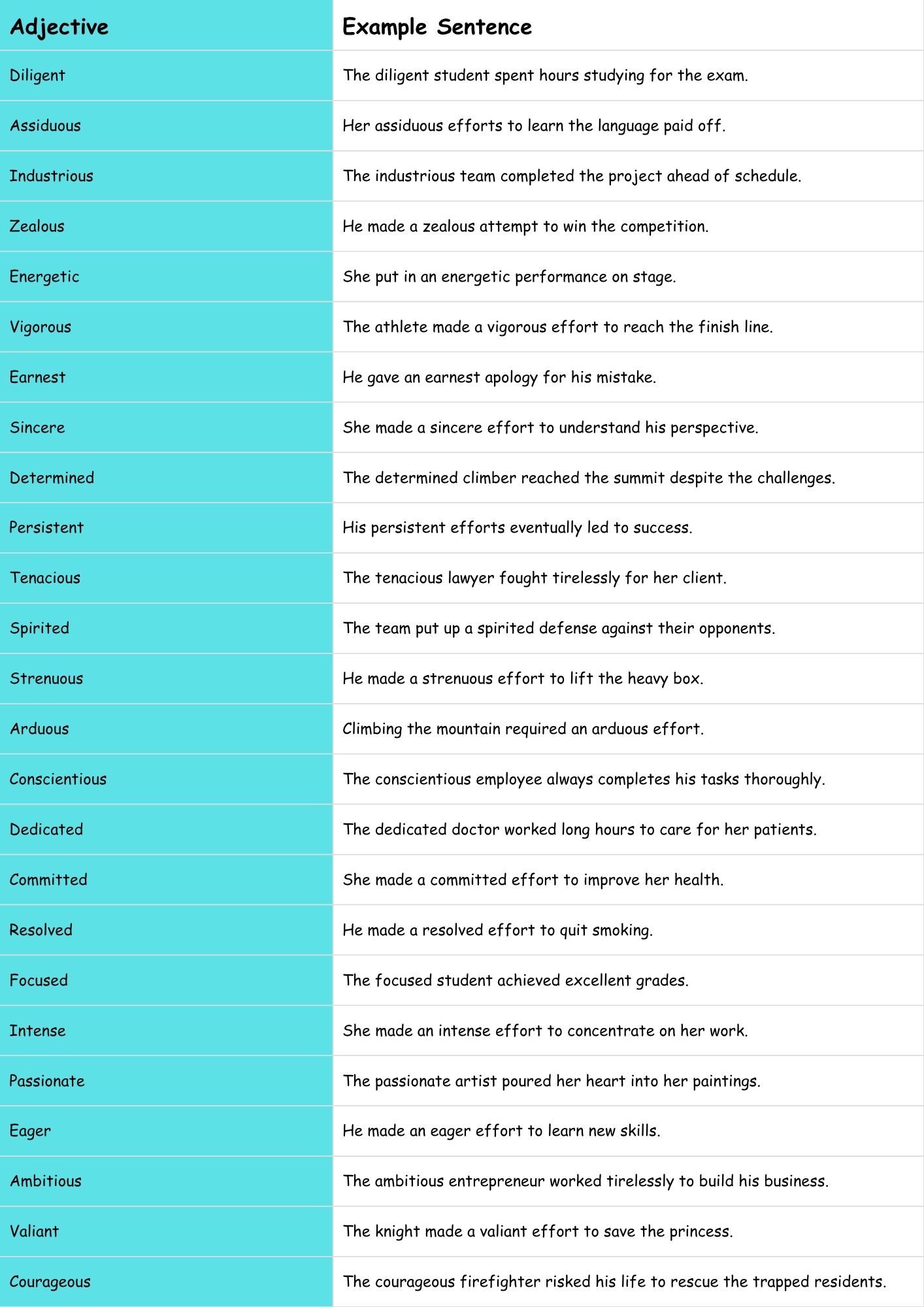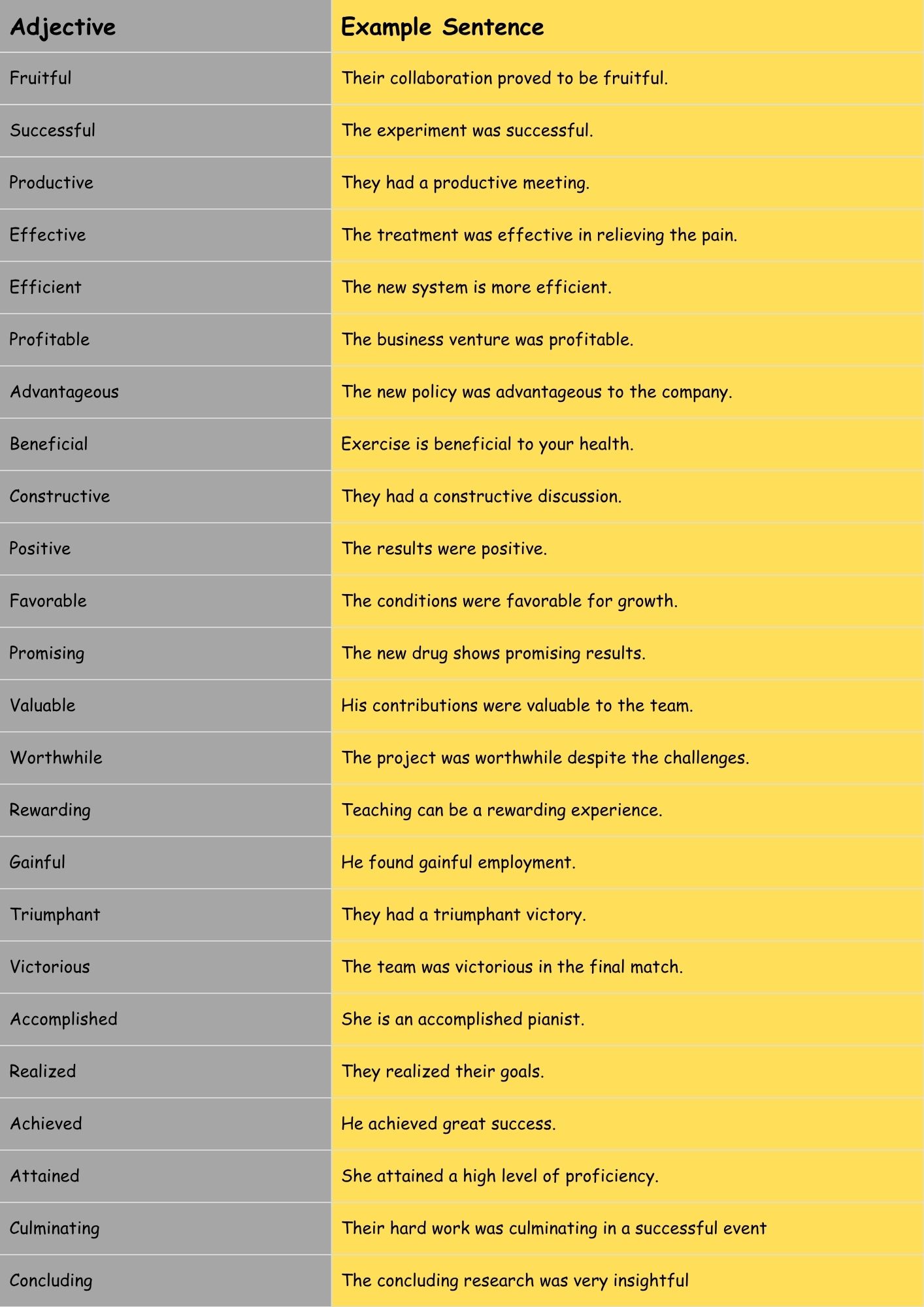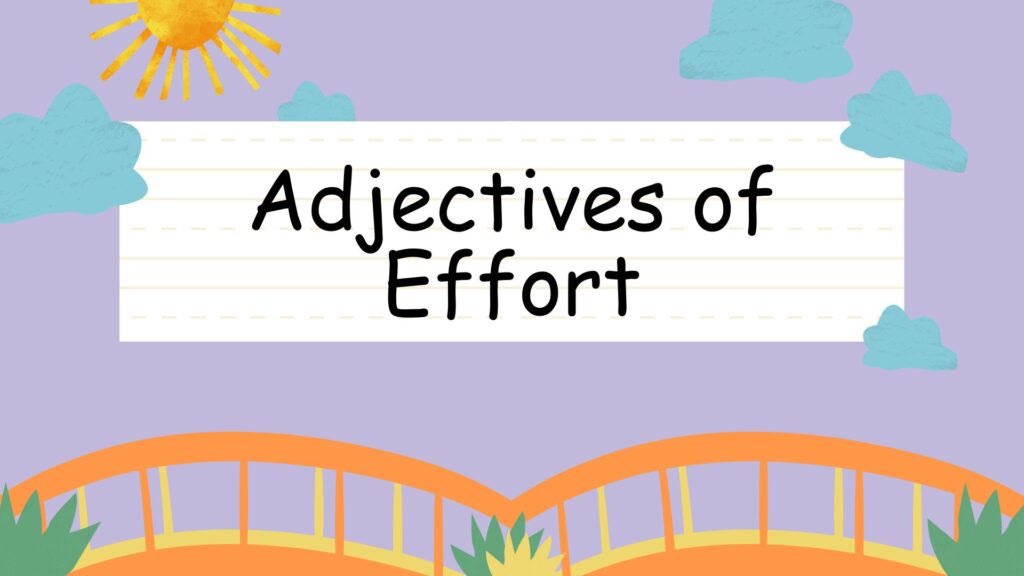Adjectives of effort are essential for conveying the intensity, quality, and outcome of actions in English. They allow us to describe not just what someone is doing, but how they are doing it, adding depth and nuance to our communication. Understanding and using these adjectives effectively can significantly enhance your writing and speaking skills, making your language more vivid and impactful. This article will guide you through the definition, types, usage, and common mistakes associated with adjectives of effort, providing you with numerous examples and practice exercises to solidify your understanding. Whether you’re a beginner or an advanced learner, this comprehensive guide will equip you with the knowledge and skills to master adjectives of effort.
Table of Contents
- Definition of Adjectives of Effort
- Structural Breakdown
- Types and Categories of Adjectives of Effort
- Examples of Adjectives of Effort
- Usage Rules
- Common Mistakes
- Practice Exercises
- Advanced Topics
- FAQ
- Conclusion
Definition of Adjectives of Effort
Adjectives of effort are descriptive words that modify nouns or pronouns, specifically to describe the level, quality, or nature of the effort being exerted. They provide information about how much energy, dedication, or intensity is applied to a task or activity. These adjectives can describe physical, mental, or emotional exertion. They are crucial for providing detailed and nuanced descriptions, allowing listeners or readers to understand the degree to which something is accomplished. They enrich our language, making it more precise and evocative. The function of these adjectives is to add specific details about the nature of the effort.
For instance, saying “He made a valiant effort” conveys a much stronger sense of determination and courage compared to simply saying “He made an effort.” The adjective “valiant” adds a layer of meaning, highlighting the courageous nature of the attempt. Similarly, “She put in a lackadaisical effort” suggests a lack of enthusiasm or motivation. This precision is why understanding and using adjectives of effort correctly is so important.
Structural Breakdown
Adjectives of effort, like all adjectives, typically precede the noun they modify. However, they can also appear after a linking verb, such as be, seem, appear, or become. The structural placement affects the sentence flow and emphasis. Understanding these placements is key to using adjectives of effort effectively.
Before a noun: In this structure, the adjective directly modifies the noun. For example, “a diligent student,” where “diligent” describes the student.
After a linking verb: Here, the adjective describes the subject of the sentence. For example, “The student was diligent,” where “diligent” describes the student’s state or quality.
Adjectives can also be modified by adverbs to further intensify or qualify the effort. For example, “He made a remarkably strenuous effort” or “She put in a somewhat half-hearted effort.” These adverbs add another layer of detail, allowing for even more precise descriptions of effort.
Types and Categories of Adjectives of Effort
Adjectives of effort can be categorized based on the nature of the effort they describe. This categorization helps in selecting the most appropriate adjective to convey the intended meaning. We can broadly classify them into positive, negative, neutral, and result-oriented categories.
Positive Effort
These adjectives describe effort that is characterized by dedication, energy, and a desire for a successful outcome. They often imply a willingness to work hard and overcome challenges. Words like “diligent,” “assiduous,” and “industrious” fall into this category.
Negative Effort
These adjectives describe effort that is lacking in energy, enthusiasm, or sincerity. They often suggest a lack of motivation or a half-hearted attempt. Examples include “lackadaisical,” “perfunctory,” and “half-hearted.”
Neutral Effort
These adjectives describe effort without implying a positive or negative connotation. They simply describe the amount or type of effort exerted. Examples include “considerable,” “significant,” and “noticeable.”
Result-Oriented Effort
These adjectives focus on the outcome or impact of the effort. They often describe effort that is effective or productive. Examples include “fruitful,” “successful,” and “productive.”
Examples of Adjectives of Effort
The following tables provide numerous examples of adjectives of effort, categorized by their type. Each example is presented in a sentence to illustrate its usage in context. Understanding these examples will help you use these adjectives effectively in your own writing and speaking.
Table 1: Positive Adjectives of Effort
This table showcases adjectives that describe positive, dedicated effort, highlighting the drive and determination behind the actions.
| Adjective | Example Sentence |
|---|---|
| Diligent | The diligent student spent hours studying for the exam. |
| Assiduous | Her assiduous efforts to learn the language paid off. |
| Industrious | The industrious team completed the project ahead of schedule. |
| Zealous | He made a zealous attempt to win the competition. |
| Energetic | She put in an energetic performance on stage. |
| Vigorous | The athlete made a vigorous effort to reach the finish line. |
| Earnest | He gave an earnest apology for his mistake. |
| Sincere | She made a sincere effort to understand his perspective. |
| Determined | The determined climber reached the summit despite the challenges. |
| Persistent | His persistent efforts eventually led to success. |
| Tenacious | The tenacious lawyer fought tirelessly for her client. |
| Spirited | The team put up a spirited defense against their opponents. |
| Strenuous | He made a strenuous effort to lift the heavy box. |
| Arduous | Climbing the mountain required an arduous effort. |
| Conscientious | The conscientious employee always completes his tasks thoroughly. |
| Dedicated | The dedicated doctor worked long hours to care for her patients. |
| Committed | She made a committed effort to improve her health. |
| Resolved | He made a resolved effort to quit smoking. |
| Focused | The focused student achieved excellent grades. |
| Intense | She made an intense effort to concentrate on her work. |
| Passionate | The passionate artist poured her heart into her paintings. |
| Eager | He made an eager effort to learn new skills. |
| Ambitious | The ambitious entrepreneur worked tirelessly to build his business. |
| Valiant | The knight made a valiant effort to save the princess. |
| Courageous | The courageous firefighter risked his life to rescue the trapped residents. |

Table 2: Negative Adjectives of Effort
This table provides examples of adjectives that describe negative or insufficient effort, highlighting a lack of dedication or enthusiasm.
| Adjective | Example Sentence |
|---|---|
| Lackadaisical | He made a lackadaisical attempt to clean his room. |
| Perfunctory | She gave a perfunctory nod of acknowledgement. |
| Half-hearted | He made a half-hearted effort to apologize. |
| Apathetic | The student showed an apathetic attitude towards learning. |
| Indifferent | She was indifferent to the outcome of the game. |
| Lethargic | His lethargic movements indicated a lack of energy. |
| Listless | She gave a listless performance on stage. |
| Sluggish | The economy showed a sluggish recovery. |
| Passive | He took a passive role in the discussion. |
| Reluctant | She was reluctant to accept the offer. |
| Unenthusiastic | He gave an unenthusiastic response to the proposal. |
| Lukewarm | The audience gave a lukewarm reception to the play. |
| Token | He made a token effort to help. |
| Superficial | She had a superficial understanding of the topic. |
| Nominal | He paid a nominal fee for the service. |
| Feeble | He made a feeble attempt to defend himself. |
| Weak | She put in a weak performance in the competition. |
| Ineffectual | His ineffectual efforts did little to improve the situation. |
| Frivolous | She wasted her time on frivolous activities. |
| Negligent | His negligent actions caused the accident. |
| Careless | The careless mistake cost them the game. |
| Sloppy | He did a sloppy job on the assignment. |
| Amateurish | The painting looked amateurish. |
| Unprofessional | His behavior was unprofessional. |
| Remiss | He was remiss in his duties. |
Table 3: Neutral Adjectives of Effort
This table includes adjectives that describe effort without implying a positive or negative judgment, focusing on the quantity or nature of the exertion.
| Adjective | Example Sentence |
|---|---|
| Considerable | He put in a considerable amount of effort. |
| Significant | She made a significant contribution to the project. |
| Noticeable | There was a noticeable improvement in his performance. |
| Substantial | They invested a substantial amount of money in the company. |
| Marked | There was a marked difference in their attitudes. |
| Appreciable | There was an appreciable increase in sales. |
| Measurable | There was a measurable impact on the environment. |
| Tangible | They achieved tangible results from their efforts. |
| Quantifiable | The benefits were quantifiable. |
| Pronounced | There was a pronounced accent in his speech. |
| Intense | He felt intense pressure to succeed. |
| Great | She showed great determination. |
| Enormous | They faced enormous challenges. |
| Immense | He felt an immense sense of relief. |
| Extensive | They conducted extensive research. |
| Broad | She has a broad knowledge of the subject. |
| Wide | There is a wide range of opinions on the matter. |
| Deep | He has a deep understanding of the topic. |
| Profound | She made a profound impact on his life. |
| Detailed | He provided a detailed explanation. |
| Comprehensive | They conducted a comprehensive study. |
| Thorough | She did a thorough job on the report. |
| Systematic | They took a systematic approach to solving the problem. |
| Methodical | He followed a methodical process. |
| Rigorous | They conducted a rigorous analysis. |
Table 4: Result-Oriented Adjectives of Effort
This table presents adjectives that focus on the effectiveness or productivity of the effort, emphasizing the outcomes achieved.
| Adjective | Example Sentence |
|---|---|
| Fruitful | Their collaboration proved to be fruitful. |
| Successful | The experiment was successful. |
| Productive | They had a productive meeting. |
| Effective | The treatment was effective in relieving the pain. |
| Efficient | The new system is more efficient. |
| Profitable | The business venture was profitable. |
| Advantageous | The new policy was advantageous to the company. |
| Beneficial | Exercise is beneficial to your health. |
| Constructive | They had a constructive discussion. |
| Positive | The results were positive. |
| Favorable | The conditions were favorable for growth. |
| Promising | The new drug shows promising results. |
| Valuable | His contributions were valuable to the team. |
| Worthwhile | The project was worthwhile despite the challenges. |
| Rewarding | Teaching can be a rewarding experience. |
| Gainful | He found gainful employment. |
| Triumphant | They had a triumphant victory. |
| Victorious | The team was victorious in the final match. |
| Accomplished | She is an accomplished pianist. |
| Realized | They realized their goals. |
| Achieved | He achieved great success. |
| Attained | She attained a high level of proficiency. |
| Culminating | Their hard work was culminating in a successful event |
| Concluding | The concluding research was very insightful |

Usage Rules
The correct usage of adjectives of effort involves adhering to standard grammatical rules for adjectives in general. This includes proper placement, agreement, and modification. It’s also important to choose adjectives that accurately reflect the intended meaning and context. Using the wrong adjective can alter the entire message.
Placement: As mentioned earlier, adjectives typically precede the noun they modify. However, they can also follow linking verbs. The choice depends on the desired emphasis and sentence structure.
Agreement: Adjectives in English do not change form to agree with the noun they modify in terms of number or gender, unlike in some other languages.
Modification: Adjectives can be modified by adverbs to intensify or qualify their meaning. For example, “very diligent” or “somewhat lackadaisical.”
Context: The choice of adjective should be appropriate for the context. Consider the situation, the subject, and the intended message when selecting an adjective of effort. For instance, using “valiant” to describe cleaning a room would be inappropriate; “diligent” would be a better choice.
Common Mistakes
Learners often make mistakes when using adjectives of effort, such as using the wrong adjective, misplacing the adjective in the sentence, or using an adjective that doesn’t fit the context. Recognizing these common errors is the first step towards avoiding them. Here are some common mistakes and corrections:
Incorrect adjective: Using an adjective that doesn’t accurately reflect the effort being described.
- Incorrect: He made a lackadaisical effort and succeeded.
- Correct: He made a diligent effort and succeeded.
Misplaced adjective: Placing the adjective in the wrong part of the sentence.
- Incorrect: The student studying diligent.
- Correct: The diligent student was studying.
Inappropriate context: Using an adjective that doesn’t fit the situation.
- Incorrect: She made a valiant effort to bake a cake.
- Correct: She made a diligent effort to bake a cake.
Incorrect modification: Using an adverb that doesn’t logically modify the adjective.
- Incorrect: He made a quickly diligent effort.
- Correct: He made a very diligent effort.
Practice Exercises
These exercises will help you practice using adjectives of effort correctly. Each exercise focuses on a different aspect of their usage. Complete the exercises and check your answers to reinforce your understanding.
Exercise 1: Fill in the Blanks
Choose the most appropriate adjective of effort from the list to complete each sentence. (diligent, lackadaisical, considerable, fruitful)
Table 5: Exercise 1
| Question | Answer |
|---|---|
| 1. The ______ student always completes his homework on time. | diligent |
| 2. He made a ______ attempt to clean the house, but it was still messy. | lackadaisical |
| 3. She put in a ______ amount of effort to learn the new software. | considerable |
| 4. Their collaboration proved to be very ______. | fruitful |
| 5. Despite his best intentions, his attempt was ______. | lackadaisical |
| 6. The project required a ______ investment of time and resources. | considerable |
| 7. With ______ research and planning, the project was a success. | diligent |
| 8. The meeting was not very ______, and little was accomplished. | fruitful |
| 9. She was praised for her ______ work ethic. | diligent |
| 10. He gave a ______ apology, but it wasn’t sincere. | lackadaisical |
Exercise 2: Correct the Mistakes
Identify and correct the mistakes in the following sentences. Each sentence contains one error related to the use of adjectives of effort.
Table 6: Exercise 2
| Question | Answer |
|---|---|
| 1. He made a valiant effort, but for cleaning his room. | He made a diligent effort to clean his room. |
| 2. The student studying diligent for the exam. | The diligent student was studying for the exam. |
| 3. She gave a effort lackadaisical to finish the project. | She gave a lackadaisical effort to finish the project. |
| 4. They put considerable effort, but and failed anyway. | They put in considerable effort, but failed anyway. |
| 5. He felt indifferent effort to help. | He made an indifferent effort to help. |
| 6. The experiment was success, because diligent. | The experiment was a success because of diligent work. |
| 7. She’s a assiduous student, with hard work. | She’s an assiduous student who works hard. |
| 8. The team was energetic, but with passive results. | The team was energetic, but the results were passive. |
| 9. The meeting was fruitful for no discussion. | The meeting was not fruitful because there was no discussion. |
| 10. He made an effort, but indifferent. | He made an indifferent effort. |
Exercise 3: Sentence Completion
Complete each sentence with an appropriate adjective of effort. Be creative and choose adjectives that fit the context well.
Table 7: Exercise 3
| Question | Possible Answer |
|---|---|
| 1. The ______ athlete trained tirelessly for the Olympics. | dedicated |
| 2. Despite his ______ attempts, he couldn’t solve the problem. | feeble |
| 3. The ______ team worked together to achieve their goals. | industrious |
| 4. She made a ______ effort to comfort her friend. | sincere |
| 5. The ______ student always asked thoughtful questions in class. | diligent |
| 6. His ______ attitude towards his studies was disappointing. | lackadaisical |
| 7. The ______ research yielded valuable insights. | thorough |
| 8. She made a ______ attempt to learn how to play the guitar. | spirited |
| 9. The ______ employee was always willing to go the extra mile. | conscientious |
| 10. The ______ effort to improve the company’s image paid off. | strategic |
Advanced Topics
For advanced learners, understanding the nuances of adjectives of effort can involve exploring more complex aspects such as figurative language, idiomatic expressions, and subtle differences in meaning between similar adjectives. You can also delve into the etymology and historical usage of these words. This deeper understanding will allow for more sophisticated and effective communication.
Figurative Language: Adjectives of effort can be used metaphorically to describe abstract concepts or situations. For example, “a strenuous debate” uses “strenuous” to describe the intensity of the debate, rather than physical exertion.
Idiomatic Expressions: Some adjectives of effort appear in idiomatic expressions that have specific meanings. For example, “a half-hearted attempt” is an idiom that means an attempt made without much enthusiasm or commitment.
Subtle Differences: Many adjectives of effort have similar meanings but convey slightly different nuances. For example, “diligent” implies consistent effort, while “assiduous” suggests careful and meticulous attention to detail. Understanding these subtle differences can help you choose the most appropriate adjective for a given situation.
FAQ
Here are some frequently asked questions about adjectives of effort:
Q1: What are adjectives of effort?
A1: Adjectives of effort are descriptive words that modify nouns or pronouns to describe the level, quality, or nature of the effort being exerted. They provide information about how much energy, dedication, or intensity is applied to a task or activity.
Q2: How do adjectives of effort differ from other adjectives?
A2: While all adjectives describe nouns, adjectives of effort specifically focus on describing the characteristics of the effort being made. They add detail about the intensity, quality, or outcome of the action.
Q3: Can adjectives of effort be used with adverbs?
A3: Yes, adjectives of effort can be modified by adverbs to further intensify or qualify their meaning. For example, you can say “very diligent” or “somewhat lackadaisical.”
Q4: What are some common mistakes to avoid when using adjectives of effort?
A4: Common mistakes include using the wrong adjective for the context, misplacing the adjective in the sentence, and using an adjective that doesn’t accurately reflect the effort being described.
Q5: How can I improve my use of adjectives of effort?
A5: Practice using them in different contexts, pay attention to the subtle differences in meaning between similar adjectives, and read widely to see how native speakers use them effectively. Consider using a thesaurus to expand your vocabulary.
Q6: Are there any adjectives of effort that have both positive and negative connotations?
A6: Some adjectives can have both positive and negative connotations depending on the context. For example, “intense” can describe a positive, focused effort or a negative, overwhelming pressure.
Q7: How do I choose the right adjective of effort for a particular situation?
A7: Consider the context, the subject, and the intended message. Think about the specific qualities of the effort you want to emphasize, such as its intensity, sincerity, or effectiveness.
Q8: Is it better to use multiple adjectives to describe an effort?
A8: While it’s possible to use multiple adjectives, it’s often more effective to choose a single, precise adjective that accurately captures the essence of the effort. Using too many adjectives can make your writing sound cluttered or redundant.
Conclusion
Mastering adjectives of effort is crucial for expressing the nuances and qualities of actions in English. By understanding their definitions, types, usage rules, and common mistakes, you can significantly enhance your communication skills. These adjectives allow you to add depth and precision to your writing and speaking, making your language more vivid and impactful. Remember to practice using these adjectives in various contexts and to pay attention to the subtle differences in meaning between similar words.
Continue to expand your vocabulary and refine your understanding of adjectives of effort, and you will find that your ability to describe and analyze effort becomes much more sophisticated. The key is consistent practice and a willingness to explore the richness and complexity of the English language. Keep practicing, and you’ll master adjectives of effort in no time!



